|
|
|
Sort Order |
|
|
|
Items / Page
|
|
|
|
|
|
|
| Srl | Item |
| 1 |
ID:
102656
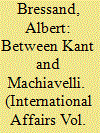

|
|
|
|
|
| Publication |
2011.
|
| Summary/Abstract |
The entry into force of the Lisbon Treaty invites and enables Europe to develop elements of a common foreign policy. Europe should resist the tendency of listing all issues calling for attention, and be aware that it will have to address three agendas, not just one. The first agenda is the Kantian one of universal causes. While it remains essential to European identity, it presents Europe with limited opportunities for success in the 2010s as could be seen at the 2009 Climate Summit in Copenhagen. The 'Alliance' agenda remains essential on the security front and would benefit from a transatlantic effort at rejuvenation on the economic one. Last but not least, the 'Machiavellian' agenda reflects what most countries would define as their 'normal' foreign policy. It calls for Europe to influence key aspects of the world order in the absence of universal causes or common values. While Europe's 'Machiavellian' experience is limited to trade policy, developing a capacity to address this third agenda in a manner that places its common interests first and reinforces its identity will be Europe's central foreign policy challenge in the 2010s. A key part of the Machiavellian agenda presently revolves around relations with Ukraine, Turkey and the Russian Federation, three countries essential to Europe's energy security that are unlikely to change their foreign policy stance faced with EU soft power. Stressing that foreign policy is about 'us' and 'them', the article looks at what could be a genuine European foreign policy vis-à-vis each of these interdependent countries, beginning with energy and a more self-interested approach to enlargement. The European public space is political in nature, as majority voting and mutual recognition imply that citizens accept 'foreigners' as legitimate legislators. At a time when the European integration process has become more hesitant and the political dimension of European integration tends to be derided or assumed away, admitting Turkey or Ukraine as members would change Europe more than it would change these countries. Foreign policy cannot be reduced to making Europe itself the prize of the relationship. What objectives Europe sets for itself in its dealing with Ukraine, Turkey and Russia will test whether it is ready for a fully-fledged foreign policy or whether the invocation of 'Europe' is merely a convenient instrument for entities other than 'Europe'.
|
|
|
|
|
|
|
|
|
|
|
|
|
|
|
|
| 2 |
ID:
102653
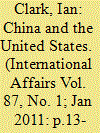

|
|
|
|
|
| Publication |
2011.
|
| Summary/Abstract |
This article critically reviews the suggestion that we are experiencing a 'succession of hegemonies' from the United States to China. It develops Martin Wight's writings on hegemony, and introduces a fundamental distinction (not made by Wight) between a power transition and a hegemonic succession. Wight held complex views about the nature of power and at times seemed to subscribe to a purely materialist account. Elsewhere he was more nuanced and appealed to the purpose of dominant states as part of his argument that influence does not correlate exactly with mass and weight. This suggestion is developed in the author's view of hegemony-as distinct from primacy-as denoting a legitimate practice within international society. These ideas are then superimposed upon current debates about a power transition, or a succession of hegemonies, as between the United States and China. The existing debate conflates those two issues. Accordingly, while it can readily be acknowledged that there are important indicators of a shift in the material distribution of power, this in no way amounts, as yet, to any kind of hegemonic succession. For the latter to occur, there would need to be clear evidence of an effective socialization of the aspirant hegemon's purpose and support for its preferred order. On the contrary, to date China has been largely content to operate within existing frameworks, rather than instigate a revision of them, and does not yet present a model for emulation elsewhere. It is possible that a power transition, without any hegemonic succession, could be corrosive of global governance.
|
|
|
|
|
|
|
|
|
|
|
|
|
|
|
|
| 3 |
ID:
102668


|
|
|
|
|
| Publication |
2011.
|
| Summary/Abstract |
The Cambridge history of the Cold War is a three-volume work by 75 contributors, mostly from the United States and the United Kingdom, and is intended as 'a substantial work of reference' on the subject. The bulk of the text deals, in frequently overlapping chapters, with the main protagonists of the conflict-viz. the United States, the Soviet Union and the People's Republic of China-and the areas in which they clashed. At the same time, it aims to go 'far beyond the narrow boundaries of diplomatic affairs', although it is not always successful in doing so. In analysing the origins of the Cold War, the contributors pay perhaps too much attention to ideology as opposed to geopolitics, a flaw which is made easier by the absence of sufficient historical background. On the other hand, the duration of the conflict and the failure of various attempts at détente is more successfully explained in terms of the zero-sum game nature of the conflict and its progressive extension from Europe across the rest of the world. When it comes to the end of the Cold War, the overall conclusion is that this came about through both a shift in the international balance of power following the Sino-Soviet split and the political and economic problems of the Soviet bloc. It is generally agreed that Mikhail Gorbachev's willingness to abandon old shibboleths both at home and abroad was a major factor in bringing about the end of the conflict. The three volumes, while not always an easy read, are the outcome of considerable research and expertise in both primary and secondary sources and will repay careful study.
|
|
|
|
|
|
|
|
|
|
|
|
|
|
|
|
| 4 |
ID:
102655
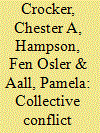

|
|
|
|
|
| Publication |
2011.
|
| Summary/Abstract |
This article surveys current security challenges and identifies obstacles to effective global and regional responses and cooperation in an era when security has become increasingly divisible. The new situation is partly explained by the complexity and variety of security challenges, both traditional and new, and by the linkages between them. It argues that a new pattern of improvised, ad hoc and often case-specific security mechanisms has developed, which it calls Collective Conflict Management (CCM). The argument is illustrated by reference to cases of CCM where a wide range of actors-multilateral institutions at the global and regional levels, individual states or ad hoc coalitions, professional and commercial bodies, and non-governmental organizations-collaborate in an effort to manage specific security threats and challenges, bringing together a variety of relationships, resources and skills. The urge for collective action, rather than unilateral or single actor-led, is motivated by a number of factors and 'drivers", not all of them necessarily positive or constructive. The article concludes that the success or failure of CCM will depend in part on the severity of the problems it faces and in part on the motives and incentives behind collective responses. This new pattern raises interesting and important questions for the future of international security. While CCM may be untidy and lack clear norms and standards, in many cases it may be the best available in an increasingly fractured world.
|
|
|
|
|
|
|
|
|
|
|
|
|
|
|
|
| 5 |
ID:
102666
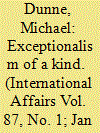

|
|
|
|
|
| Publication |
2011.
|
| Summary/Abstract |
The recent US mid-term elections have not only dented President Obama's image at home and abroad, they have seen the return to 'divided government' whereby one party controls the Executive and the other controls either the Senate or the House of Representatives or both. Such divided government has been quite frequent since the Second World War; but the situation is often portrayed by political scientists as dysfunctional, even as they acknowledge that the Founders of the Republic deliberately created a federal system which would minimize concentrations of political power. Yet divided government is only one complaint among many levelled by American commentators at their political system. This article examines such criticisms both theoretically and historically, and also develops a historical approach which discusses American attitudes to the past, particularly US foreign relations. Here the emphasis is upon the ideologies that have powered American expansion, first across the North American continent and then overseas. A peculiar, even 'exceptional' aspect of this expansion has been its rhetorical form, in particular the invocation of past presidents to justify contemporary actions and the creation of a doctrinal canon (classically expressed in the Monroe doctrine). While these two lines of enquiry (emphasizing history and political science) are the methodological double core of the article, they are not treated discretely; rather the focus is on the interplay between the two.
|
|
|
|
|
|
|
|
|
|
|
|
|
|
|
|
| 6 |
ID:
102670
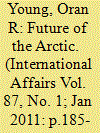

|
|
|
|
|
| Publication |
2011.
|
| Summary/Abstract |
The forces of climate change and globalization are transforming the Arctic, tightening the links between this seemingly remote region and the world at large with regard to matters of environmental protection, sustainable development, and the pursuit of peace. This has triggered an explosion of both popular and scholarly interest in the far north. Much of the resultant literature is marked by persistent expectations that the Arctic will become the scene of escalating jurisdictional conflicts, resource wars, a new great game and even armed clashes during the coming years. Yet as the books considered in this review article make clear, these expectations are greatly exaggerated; there is much to be said for the proposition that armed conflict is less likely to occur in the Arctic than in most other parts of the world anytime soon. What is needed is an alternative paradigm to provide a basis for understanding the significance of the profound changes now eroding the old order in the Arctic and establishing a basis for framing innovative governance arrangements capable of ensuring the future of the Arctic as a zone of peace.
|
|
|
|
|
|
|
|
|
|
|
|
|
|
|
|
| 7 |
ID:
102658


|
|
|
|
|
| Publication |
2011.
|
| Summary/Abstract |
India is fast emerging as an important player in regional and international arenas. However, it continues to be beset by a number of security challenges, both internally and externally. On the assumption that India's foreign policy has evolved in step with its domestic politics, this article briefly surveys the evolution of Indian domestic politics and foreign policy before discussing some of the domestic and international (including regional) security challenges India faces today. The article concludes that although economic diplomacy does at present serve India well in projecting power internationally, achieving great power status in the future will rest on the resolution of key political and security challenges.
|
|
|
|
|
|
|
|
|
|
|
|
|
|
|
|
| 8 |
ID:
102654


|
|
|
|
|
| Publication |
2011.
|
| Summary/Abstract |
It is uncontroversial that the invasion and occupation of Iraq involved the following errors: the misinterpretation of intelligence; the underestimation of the number of troops requisite for law and order; the disbanding of the Iraqi army; and indiscriminate debaathification of the civil service. The first error was one of imagination rather than virtue; the others were caused by 'callousness", impatience, and consequent imprudence. These vices were partly responsible for massive civilian casualties, which many wrongly assume to teach the fundamentally erroneous character of the invasion. Nonetheless, we should beware such moral flaws in tomorrow's policy-makers and renounce the managerial mentality that fosters them.
Another lesson is that, in so far as nation-rebuilding requires substantial and long-term commitments, it must command the support of the nation-builder's domestic electorate; and to do that, it must be able to justify itself in terms of the national interest. From this we should not infer the further lesson that morality's reach into foreign policy is limited, since, according to Thomist ethics, the pursuit of the national interest can itself be moral.
Finally, one lesson that we should not learn from Iraq is never again to violate the letter of international law and intervene militarily in a sovereign state without Security Council authorization. The law's authority can be undermined as much by the UN's failure to enforce it, as by states taking it into their own hands. It is seriously problematic that the current international legal system denies the right of individual states to use military force unilaterally except in self-defence, while reserving the enforcement of international law to a body, whose capacity to act is hamstrung by the right of veto. Given this situation, military intervention without Security Council authorization could be morally justified on certain conditions.
|
|
|
|
|
|
|
|
|
|
|
|
|
|
|
|
| 9 |
ID:
102652


|
|
|
|
|
| Publication |
2011.
|
| Summary/Abstract |
This article provides an analysis of President Obama at mid-term. It looks at the mid-term elections from the perspective of the political issues that informed the debate, the implications of Republican control of the House of Representatives for both legislation and relations between the administration and Congress, and the policy areas where cooperation and possible progress is possible. The article looks at the Tea Party movement as a collection of single issue and multi-issue political groups ranging from 'nativists' to Christian fundamentalists to the eclectic and unprecedented combination of fiscal and social conservatives seen at Glen Beck's 'honoring America' event at the Washington Monument. This broad movement may be seen as a classical revitalization movement, not unlike those described by Anthony F. C. Wallace. It is opposed by another 'revitalization movement' namely the 'American renewal' promised by Obama as he ran for office in 2008. These countervailing narratives-in effect two different versions of America, one reflecting the Tea Party broadly conceived and the other reflecting Obama's 'promise'-are seeking political traction among independents. The implications of this struggle are momentous. The prevailing narrative will frame policy going forward on a range of domestic issues and on selected foreign policy questions, which will include the present debate on the Strategic Arms Reduction Treaty (START) with Russia and the upcoming debate on China, which will have even further reaching effects.
Finally, this article describes Obama's struggle to frame his policy successes and the ensuing debate in a favourable light. His opponents have sought to limit his progress by presenting him as 'the other", an effective but destructive technique that could have longer term effects on the domestic political discourse. However, the author remains an optimist; he believes, together with 50 per cent of Americans, the president is likable, logical and gives a good speech, and that he will be re-elected in 2012.
|
|
|
|
|
|
|
|
|
|
|
|
|
|
|
|
| 10 |
ID:
102665
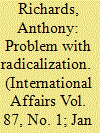

|
|
|
|
|
| Publication |
2011.
|
| Summary/Abstract |
This article questions the utility of the term 'radicalization' as a focus for counter-terrorism response in the UK. It argues that the lack of clarity as to who the radicalized are has helped to facilitate a 'Prevent' strand of counterterrorism strategy that has confusingly oscillated between tackling violent extremism, in particular, to promoting community cohesion and 'shared values' more broadly. The article suggests that the focus of counterterrorism strategy should be on countering terrorism and not on the broader remit implied by wider conceptions of radical-ization. This is not to diminish the importance of contextual or 'root cause' factors behind terrorism, but, if it is terrorism that is to be understood and countered, then such factors should be viewed within the terrorism-counterterrorism discourse and not a radicalization-counter-radicalization one. The article goes on to consider the characterization of those presenting a terrorist threat to the UK as being 'vulnerable' to violent extremism. While it argues that the notion of vulnerable individuals and communities also lends itself to a wider 'Prevent' remit, it cautions that the impetus towards viewing terrorism as the product of vulnerability should not deflect us from what has generally been agreed in terrorism studies-that terrorism involves the perpetration of rational and calculated acts of violence.
|
|
|
|
|
|
|
|
|
|
|
|
|
|
|
|
| 11 |
ID:
102660


|
|
|
|
|
| Publication |
2011.
|
| Summary/Abstract |
This article assesses the contribution that IGAD has made to regional security in the Horn of Africa since the adoption of its peace and security mandate in 1996. It describes the evolution of IGAD and its mandate in the context of regional conflict and wider African peace and security processes. It explores the local dynamics of the two major IGAD-led peace processes, in Sudan (1993-2005) and in Somalia (2002-2004), and discusses the effectiveness of IGAD's institutional role. A consideration of the wider impact of the peace agreements highlights the way IGAD has enhanced its role by setting the agenda on peace support operations in Somalia. The article concludes that IGAD's successes are more the result of regional power politics than of its institutional strength per se. Despite the obvious need for a better regional security framework, the scope for the IGAD Secretariat to develop an autonomous conflict-resolution capability will remain limited. However, IGAD brings a new diplomatic dimension to conflict management that locks in regional states and locks out interested parties beyond the region. With regard to Somalia, the organization has played a pivotal role in directing African and wider international responses to conflict in the region.
|
|
|
|
|
|
|
|
|
|
|
|
|
|
|
|
| 12 |
ID:
102663


|
|
|
|
|
| Publication |
2011.
|
| Summary/Abstract |
Carl von Clausewitz might seem an unusual thinker to invoke in the name of wildlife protection but his insights into the nature of war provide a unique perspective into an arena that arguably poses more complex moral questions of responsibility to protect than with humans. The increasingly dangerous world of wildlife conservation offers a prism for examining many issues linked to sovereignty, especially in developing countries. This study highlights how the commercial rewards of the wildlife trade have fed into problems surrounding national security such as corruption, sub-state insurgency and state legality. These factors have led to the growing militarization of wildlife protection and, in turn, raise a fundamental question: is it ever right for an outside actor to ignore international convention to save a species from extinction?
|
|
|
|
|
|
|
|
|
|
|
|
|
|
|
|
|
|
|
|
|